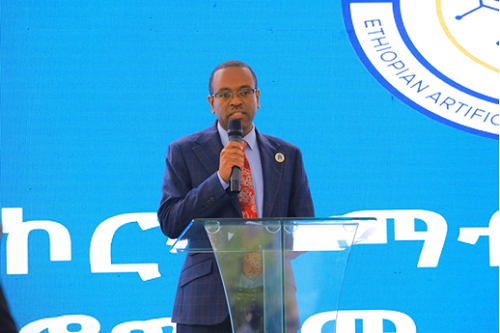
The Federal Supreme Court has just launched Smart Court System aiming at transforming the service delivery in the judicial system using technology. Developed by Artificial Intelligence Institute, the modern technology-assisted smart court system, targets at modernizing and transforming the judicial services in Ethiopia. By introducing technology-assisted smart court system, the Federal Supreme Court’s goal is to provide effective, transparent, inclusive and easily accessible, and quality judicial service delivery.
The newly introduced technology-assisted smart court system enables to promote access to justice, to fasten dispute resolution, to save time and cost in judicial process. The locally developed artificial intelligence supported smart system application was developed by Ethiopian professionals’ plans to develop the traditional way of managing judicial process through technology and helps to develop the manual systems into digital system. Using the new technology, court rooms are believed to develop in to smart court rooms that are supported by smart technologies.

The litigations of the disputing parties in the courts and the testimony of the witnesses, so far, are recorded manually. The newly inaugurated smart court would solve this problem of good governance and play a great role in enabling consumers to get services without harassment.
During the launching ceremony of the Smart Court System at the Federal Supreme Court here in Addis Ababa recently, Artificial Intelligence Institute Director-General, Engineer Worku Gachena said that the new technology based smart court system will modernize the service delivery in the judicial system. As to him, technology is helping institutions to modernize services and to provide efficient and effective services. As technology helps the whole process and easing service provision, it saves time and resources.
According to Worku the digital smart court system enables to integrate courts’ work. Through the technology-assisted judicial system, as to him, will help courts to act effectively as it reduces time wastage, where judges make decisions online without being physically present, and allows for witness blackmail. In addition, the new system also includes online testimony and natural language processing (audio-to-text) technology which speeds up the trial process.
As the system includes natural language processing or audio-to-text transcriber, it helps the trial system by easily transcribing voices in to written format during the judicial process immediately and provided to the judges immediately.
Secondly, the system has a Chat Bot service system, Worku reiterated. The chat bot system is a robot service system that helps customers to easily access information about their case in the court through their smart phones or computers. “This system is an alternative for customers to find necessary information about their cases in courts without the need to present in the courts physically,” the Director-General reiterated. In addition, according to Worku, the chat bot system helps customers to submit complaints to the courts online and follow the process.
Hence, Worku stated that, the implementation of the smart court system can facilitate and ease services in the judicial system and can solve administrative and good governance problems in the sector. The technology-assisted smart system in the judicial sector can help in solving the problems in the field through providing appropriate data and information.
House of Peoples Representatives (HPR) Speaker, Tagesse Chafo, for his part stated that the newly applied smart court system will help to provide efficient, accessible, inclusive, transparent, quality evaluated and honest judicial services for all citizens. “As Ethiopia is striving to realize Digital Ethiopia 2023 Strategy, the implementation of smart technology in the judicial system is a step to realize Ethiopia’s strategy in all sectors,” Tagesse said.
According to the house speaker, the new application and models in the court rooms and in the court system in general is a new chapter in modernizing Ethiopia’s judicial system. As this is a critical step in the field, efforts should continue to apply the system in all courts. He recommended implementing the smart court system in regional states, as well. According to the speaker, the system would help the customers to get quality services without being subjected to unnecessary expenses.
President of the Federal Supreme Court, Tewodros Mehret for his part said that the court is taking various reform measures to provide efficient and effective services for customers. As part of the efforts, it introduced the smart court system to assist the judicial procedures assisted by modern technology.
According to the president, justice has a great value for the economic, social and political stability and creating a stable society of a country. “If there is no justice, there will be no peace and development,” the President said. Hence, providing inclusive, effective, transparent and quality judicial service is essential in creating a just society. To realize that, modernizing the services is critical so as to make the process accessible and transparent for all and the new smart court system will help in realizing it, he added.
The new smart court, technology-assisted system that has been put into operation is a part of this effort and stated that the modern system will make the judicial service more effective. The smart court has components such as audio transcription, smart chat bot/ Al based interactive Chabot, information desk and others, he reiterated.
Currently, various technological innovations, including artificial intelligence, are expected to solve various problems providing appropriate judicial services to the community. The new AI application will help courts to apply vertical judgments and hearing of voices of witnesses. The new technological system is expected to facilitate the service delivery in the judiciary system.
BY DARGIE KAHSAY
THE ETHIOPIAN HERALD FRIDAY 19 JANUARY 2024





